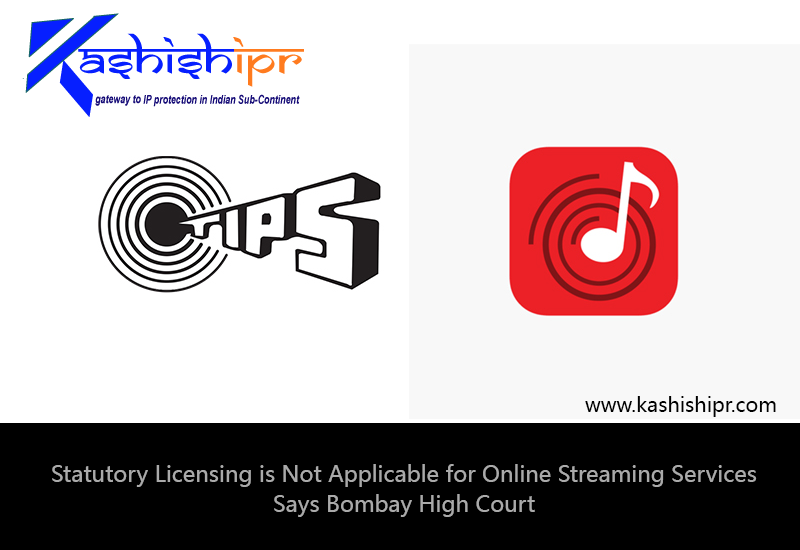Statutory Licensing is Not Applicable for Online Streaming Services, Says Bombay High Court
A recent judgement of the Bombay High Court has finally put an end to the intricate saga of the statutory licensing scheme applicability, under the Copyright Act of online streaming service. The court has permitted an interim injunction in the favor of Tips Industries against Airtel-owned music streaming app Wynk. The Plaintiff sought a short-term order to restrict Wynk from further downloading and streaming of Tips Music. Justice SJ Kathawalla categorically declined the argument that online streaming service is entitled to grant a statutory license for broadcasting under Copyright Act, Section 31D.
Overview
The plaintiff is Tips Industries Ltd., owner of a music label in India, which controls copyright over the considerable depository of music. In 2016, the license of this repository was given to the defendant, Wynk Music Ltd. After the license expired in 2016, both the parties tried to negotiate the licensing terms and conditions for permitting Wynk to download and stream the music repository of Tips.
After the negotiation was dismantled, Wynk took protection by citing Section 31D of the Copyright Act. The Section 31D for a statutory licensing scheme as per any broadcasting organization, desirous of ‘communicating to the public’ any music recording, may acquire a statutory license for this, as long as they pay the royalty fee to the copyright holder, according to the rates fixed by the Intellectual Law Board.
Tips challenged the citation of Section 31D by the Wynk, and took legal action against Wynk for violating their sound recording copyright under section 14 (1) (e). Justice CJ Kathawalla systematically rejected the defendant’s claim for copyright infringement, and prima facie found Wynk culpable in direct violation for two reasons- first, for selling the music under Section14) (e) (ii), secondly, for granting the downloading and offline streaming of the plaintiff’s work and for communicating the Tips’ work to the public through their streaming service, under Section 14 (1) (e) (iii).
The Bombay High Court recognized the Plaintiff’s claim of copyright infringement, and shed light on ambiguities related to online streaming and the statutory licensing scheme under Section 31D
- Section 31D does not encompass purchase or downloading of work
The court stated that Wynk’s feature of allowing the clients to download song and store for the unlimited time period constituted a sale and not public communication, and consequently, did not include the broadcasting as per the Section 31D. Hence, Wynk cannot proclaim the statutory license for the same.
- Section 31D does not include Internet Broadcasting
This was the main bone of contention. Wynk asserted that Section 31D covers online Broadcasting and its streaming service is involved within the radio broadcasting.
Wynk also relied upon the inter alia of DPIIT office memorandum from 2016, which implied that Section 31D clearly cover internet broadcasting.
However, the court straight away rejected this argument.
The court held that Section 31D was a deviation to copyright case, and must not be taken into consideration for all cases. Justice Kathawalla also said that section 31D clearly includes only radio and television broadcasting, and does not comprise internet broadcasting. Therefore, the accused could not argue that the legislature intended ‘radio’ broadcast to include online broadcasts.
The court also denied that defendant‘s dependence upon the Government of India Office Memorandum, declaring that it was not in the nature of ‘guidelines’ and required statutory authority and consequently could not involve in the statutory scheme under Section 31D.
- Section 31D cannot be cited without the prior regulation of rates by the IPAB
The court asserted that the Independent Payment Advisory Board (IPAB) did not have the right of regulating the rates for internal broadcasting. Further, the Court held that statutory scheme under Section 31D, including Rules 29, 30, and 31 of the Copyright rights, indicate that prior regulation of royalty rate by the IPAB was imperative for the statutory license citation, under Section 31D.
The defendant also tried to hold that Rules 29, 30 and, 31 were ultra vires section which were meant for the royalty rate regulation, but this argument was dismissed by Justice Kathawalla, who opined that there is a massive irregularity between the statute and the rules.
Finally, the court granted an interim injunction to the plaintiff, considering the fact that they made a prima facie case, would have suffered irreparable loss in the form of revenue, and the balance of convenience was also in the favor of the plaintiff. For more visit: https://www.kashishipr.com/

